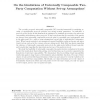Free Online Productivity Tools
i2Speak
i2Symbol
i2OCR
iTex2Img
iWeb2Print
iWeb2Shot
i2Type
iPdf2Split
iPdf2Merge
i2Bopomofo
i2Arabic
i2Style
i2Image
i2PDF
iLatex2Rtf
Sci2ools
EUROCRYPT
2003
Springer
2003
Springer
On the Limitations of Universally Composable Two-Party Computation without Set-up Assumptions
The recently proposed universally composable (UC) security framework for analyzing security of cryptographic protocols provides very strong security guarantees. In particular, a protocol proven secure in this framework is guaranteed to maintain its security even when run concurrently with arbitrary other protocols. It has been shown that if a majority of the parties are honest, then universally composable protocols exist for essentially any cryptographic task in the plain model (i.e., with no setup assumptions beyond that of authenticated communication). When honest majority is not guaranteed, general feasibility results are known only given trusted set-up, such as in the common reference string model. Only little was known regarding the existence of universally composable protocols in the plain model without honest majority, and in particular regarding the important special case of two-party protocols. We study the feasibility of universally composable two-party function evaluation i...
Related Content
| Added | 06 Jul 2010 |
| Updated | 06 Jul 2010 |
| Type | Conference |
| Year | 2003 |
| Where | EUROCRYPT |
| Authors | Ran Canetti, Eyal Kushilevitz, Yehuda Lindell |
Comments (0)

